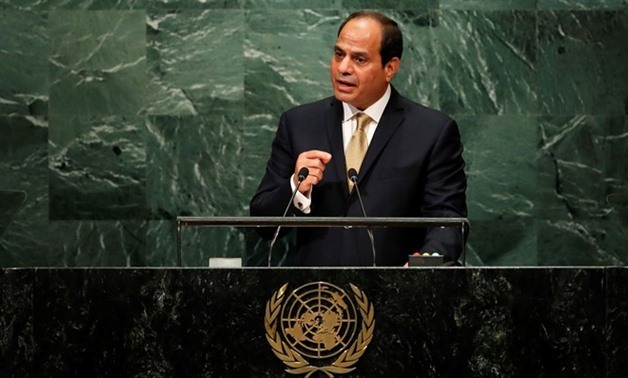
FILE- President Abdel Fatah al-Sisi
CAIRO – 25 September 2018: President Abdel Fatah al-Sisi affirmed Egypt’s belief in the role of the private sector, clarifying his country's intention to continue the economic reforms program which will facilitate the work of the private sector and enhance its role in all fields.
This came during Sisi’s participation in the working dinner organized by the Business Council for International Understanding, a non-profit organization that promotes dialogue between political leaders and business communities around the world.
Sisi noted that boosting the private sector’s role includes the implementation of the major development projects, especially the development of the Suez Canal, in addition to the establishment of a number of new cities including the New Administrative Capital and the new city of Alamein, which will speed up the completion of various projects and contribute strongly to the implementation of the National Strategy for Sustainable Development “Vision 2030”.
Chairman of the Business Council Peter Chansky praised Egypt's successful experience in economic reforms, according to Ambassador Bassem Rady, the presidency spokesman.
Rady added that Chansky stressed his council’s determination to continue to support economic cooperation between Egypt and the United States in various fields.
The spokesman added that the president reviewed the developments witnessed by Egypt and the region over the past years and the unprecedented challenges which have necessitated working to stabilize the state, maintain stability and implement an integrated economic and social reform program to increase the competitiveness of the national economy and encourage foreign investments.
During the dinner, the council’s members affirmed their aspiration to further strengthen trade relations between Egypt and the United States by expanding existing investment activities or launching new ones during the coming period.
In this context, Sisi reviewed the national projects being established in Egypt, stressing that the current stage is particularly focused on enhancing investment in Egyptians' health, and education through launching a series of major projects and programs at the national level that will improve the quality of life of citizens.
Ministers of investment and international cooperation, health and population, and trade and industry reviewed opportunities for joint economic cooperation, noting the ongoing reforms in many areas, including the comprehensive health insurance project, Virus C initiative, transport, railways, trade, and education development, among other areas of economic cooperation.
The spokesman added that Sisi praised the role of the Business Council for International Understanding in enhancing the dialogue between the Egyptian government and major US companies to promote international trade and achieve economic growth, stressing Egypt's keenness to strengthen the Egyptian-American economic partnership.
Egypt embarked on a bold economic reform program that included the introduction of taxes, such as the value-added tax (VAT), and cutting energy subsidies, with the aim of trimming the budget deficit.
Egypt also provides facilities and legislative reforms to encourage investors to invest in Egypt.
The legislative and regulatory aspects include the issuance of several laws and regulations, namely the new investment law and its executive regulations; the law of restructuring and reconciliation, bankruptcy and postponement of financing and privatization; and the amendments of the law of companies and the capital market and their executive regulations.
The new investment law includes a number of clear incentives and full guarantees for investors, providing them with several incentives and treats men, women, Egyptian and foreign investors equally.
The law also stipulates that foreign employees should not exceed 20 percent of the total number of workers in the projects established by non-Egyptian investors.
Moreover, the bankruptcy law regulates the financial and administrative restructuring for failed projects and companies, eliminating prison sentences in bankruptcy cases and limiting punishments to a monetary fine.
It also aims to minimize the need for companies or individuals to resort to the courts and to simplify post-bankruptcy procedures.
The state also established the investors’ service center that provides services to aid in the procedures of establishing a firm, its contract, documentation, licensing and its commercial registration.

Comments
Leave a Comment